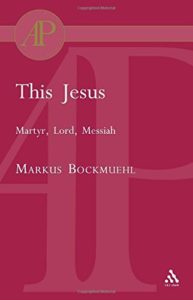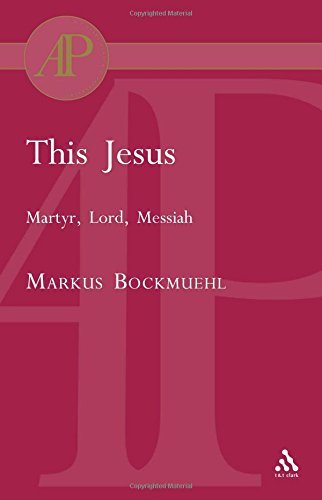 This Jesus: Martyr, Lord, Messiah, by Markus Bockmuehl (T&T Clark, 2004).
This Jesus: Martyr, Lord, Messiah, by Markus Bockmuehl (T&T Clark, 2004).
Ever since Martin Kähler’s 1892 publication (‘The so-called historical Jesus and the historic, biblical Christ’) a division between the ‘Jesus of history’ and the ‘Christ of faith’ has been a distinctive feature of both biblical studies and systematic theology. The gist of Kähler’s reading is that the Christ of faith, enshrined for us in the New Testament, is so colored by the theological faith commitments of Jesus’ early followers that the historical Jesus is hidden from plain sight.
In ‘This Jesus’ Markus Bockmuehl (MB), the Dean Ireland’s Professor at Keble College Oxford, seeks to demonstrate, “that it can be historically legitimate to see Jesus of Nazareth in organic and causal continuity with the faith of the early Church” (8). In other words, Bockmuehl attempts to present a historically responsible account of how the teachings and practice of Jesus may give rise to the theological development of early Christianity. In order to accomplish his thesis, Bockmuehl asks seven pertinent questions that address the common points promoted as elements of discontinuity between Jesus and the faith of the early church. The questions posed by Bockmuehl, which also function as the chapter headings for this volume, are as follows:
- Ch 1. Where did Jesus come from? (considers the issues surrounding the birth narratives, including the virgin birth)
- Ch 2. Was Jesus the Messiah? (argues that Jesus ‘was’ the Messiah, ‘is’ now present as the Messiah, and ‘will’ come as the Messiah)
- Ch 3. Why did Jesus predict the temple’s destruction? (a historical response to the vaticinia ex eventu reading)
- Ch 4. Did Jesus fail? (a look at the aims of Jesus and how they inform an understanding of his death)
- Ch 5. Was Jesus a Christian? (challenges the 19th c. liberal school that saw Jesus’ piety as the main point of continuity)
- Ch 6. How did Jesus Pray? (a helpful examination of Jesus’ prayers and how the content of which influenced Christianity)
- Ch 7. Why was Jesus exalted to heaven? (tackles the all important topic of the resurrection)
Bockmuehl’s primary aim here is to demonstrate points of historical continuity in the area of Christian origins, hence this book does not address various theological considerations that might also be brought into the discussion. So for instance, with respect to Jesus’ pronouncement of the destruction of the temple, Bockmuehl challenges the vaticinia ex eventu reading by identifying a significant tradition of prophetic judgement that contends the Temple will be destroyed (citing Jeremiah 9 and Daniel 9 as prominent texts). Jesus’ temple cleansing and prophetic pronouncement stand within this tradition and therefore have historical precedent. Whereas others would argue from a divine ontology, Bockmuehl answers the question from a different angle. Identifying the historical emphasis found within this volume is not a criticism of the book per se, but a description of what the volume intends to accomplish.
Bockmuehl likens his book to a weekend trip to Switzerland. Can you see the main attractions, tour the important historical locations, visit some local shops and restaurants, all within the time frame of a weekend excursion? Absolutely. Can you return home and describe Switzerland to your friends, be satisfied with your time there, and move cheerfully along with other traveling pursuits? Certainly. But you cannot exhaust all of the local intricacies, the cultural particularities, the topographical localities within he time frame of a weekend trip. So too with “This Jesus”, Bockmuehl is intending to take the reader on a weekend trip through various historical considerations that exist within the ongoing discussion regarding Jesus and subsequent Christianity. Perhaps the reader will desire more interaction with one or all of the questions posed by Bockmuehl. Perhaps this volume will be enough to satisfy. No book will receive universal agreement, but for those intending serious study within this field, This Jesus will not only serve as a primer to the discussion but will encourage the reader to continue with the task at hand.
Check it out or buy it on Amazon here.
![]()

